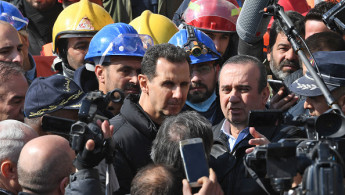Jordan FM in Syria after the earthquake: A further step towards reconciliation with Assad?
The Jordanian foreign minister’s visit to Syria Wednesday marked a turning point in what analysts believe may pave the way for more Arab normalisation with the regime in Damascus.
Promising aid following last week’s devastating earthquake, Ayman Safadi’s visit to the Syrian capital is seen by many as having more than just a humanitarian goal. The largely isolated Syrian regime is believed to be using the disaster as a gateway to ending its international isolation, although several countries including a number of Arab states either never cut or restored relations with Assad prior to the disaster.
Safadi’s was the first high-level visit by Jordan’s top diplomat to Syria in more than a decade since the conflict there began in 2011, but the two countries took steps to reopen their border in 2021.
"We discussed our bilateral relations and efforts to find a political solution to the Syrian crisis that ends this catastrophe. A solution that preserves Syria's unity and sovereignty," Safadi had said after meeting his Syrian counterpart, Faisal Mekdad, at the Damascus airport.
وزير الخارجية من مطار دمشق الدولي: رسالتنا هي الوقوف إلى جانب الشعب السوري الشقيق#عاجل #الأردن #سوريا #زلزال_سوريا #هنا_المملكة pic.twitter.com/cINgVByYkq
— قناة المملكة (@AlMamlakaTV) February 15, 2023
Jordan has since 2021 seen a thaw in its relations with the Syrian regime, and even unveiled a plan to find a political solution and create more rapprochement between Syrian President Bashar al-Assad and Arab states.
Like many Arab countries, Jordan had initially backed opposition and rebel groups fighting Assad’s forces, accusing Assad’s regime of committing war crimes against his people.
The United Arab Emirates (UAE) fully restored its ties with Syria in 2018, and Lebanon - despite adopting a disassociation policy in 2012 – has maintained relations with Syria. Arab states like Algeria, Bahrain, Oman, Lebanon, and other Arab states maintain relations with the Syrian government, and Egypt's President Abdel-Fattah al-Sisi phoned Assad after the earthquake in the first such call.
But despite improving ties, the Jordanian kingdom has struggled with drug trafficking with its northern neighbour, mainly with the amphetamine drug known as Captagon.
The drugs smuggling across southern Syria and northern Jordan has been a major sticking point for Amman, and it has seen the deaths of Jordanian soldiers and servicemen.
Analysis: Why Jordan is pushing to normalise ties with the Syrian regime - @plato010 writes https://t.co/OVUEIDhlBA
— The New Arab (@The_NewArab) August 6, 2021
Jordanian geopolitical expert Amar al-Sabaileh says Jordan didn’t need an excuse for such a visit to Syria.
"We always say that humanitarian disasters provide an opportunity to break political taboos, but in Jordan’s case, there was no need for a humanitarian disaster to go to Syria," he told Al-Araby Al-Jadeed, The New Arab's sister Arabic-language publication. "Jordan did not want to show that the visit was specific to Syria so included Turkey with it, under a humanitarian pretext."
Al-Sabaileh downplayed the surprise factor behind the visit, saying communication had been ongoing between Amman and Damascus for the past two years, while the Jordanian King Abdullah II contacted Assad twice.
He also believes Jordan will follow in the footsteps of the UAE.
He said the geographic nature and demographics which tie Syria to Jordan, as well as the security situation and economic interests gives Amman little to no choice in shifting its policy towards the Syrian regime, regardless of "international warnings."
"If you want political communication, you do not need a humanitarian catastrophe."
Public opinion in Jordan has been divided over their country’s rapprochement with Syria. While some remain in support of the Assad regime and wish to see open borders for trade and commerce, others have been supportive of the anti-Assad rebellion.
Is Turkey on the cusp of restoring ties with Syria's Assad?
— The New Arab (@The_NewArab) August 23, 2022
✍️@Adnansoutlook29 & @Solomon_Chris https://t.co/SBIvbmz6OU
More than 20 Jordanian lawmakers on Wednesday signed a parliamentary memorandum calling on the government to request from the United States, European Union, United Nations, World Health Organization and other countries to immediately lift sanctions on Syria and "end the economic blockade."
The deputies are affiliated to parties in Jordan which have been pushing for full reconciliation with Damascus.
They spoke of the necessity of "providing immediate economic and medical aid to the Syrian people to mitigate the effects of the earthquake," arguing that "the sanctions caused the suffering of international relief organisations in transporting the necessary supplies, money and medicines across the borders to Syria."
They stressed that "these sanctions have proven to be ineffective and unfair, and are considered a crime against humanity, because they target civilians - including children - the sick and the elderly."
Assad’s regime has often complained that sanctions, and in particular the US-administered Caesar Act, were behind the country’s economic woes, and more recently blamed sanctions for hampering humanitarian efforts following the quake.
Only the United States and the European Union have imposed sanctions on all or some elements in the Syrian regime, but have claimed this does not affect humanitarian aid.
Regime allies such as Russia and Iran which have provided military support throughout the conflict and have helped Assad regain much of Syria’s territory have ignored the sanctions.
The US last week said it was temporarily freezing sanctions on Syria for humanitarian purposes and will send $85 million in aid.





 Follow the Middle East's top stories in English at The New Arab on Google News
Follow the Middle East's top stories in English at The New Arab on Google News


